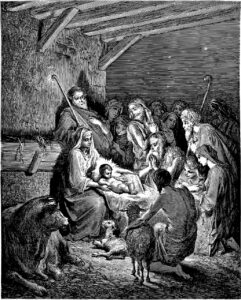The very purpose of Christ’s coming into the world was that He might offer up His life as a sacrifice for the sins of men. He came to die. This is the heart of Christmas.
—Billy Graham—
Key point: You show me someone who understands the true meaning of Christmas, and I’ll show you someone who cannot be a relativist. In other words, that person hasn’t bought into the false and perilous idea that all opinions are equally valid.
A reproducible PDF file of this article is available here. A companion article titled “Jesus’ Death and Resurrection Refute Relativism Decisively” is available here.

As Christians, as we prepare to celebrate Christmas this year, we find ourselves in a culture that continues to succumb to enticing rhetoric with deadly consequences. In other words, society has embraced evil in the name of freedom and autonomy, because it has failed completely to understand that authentic liberty is found in fulfilling one’s duties to God and to other people (also go here).
That alone is disturbing enough, but there’s more. Even though we’re living in a time when it’s especially urgent for the church speak authoritatively and prophetically about God’s holiness and wrath, yet without failing to emphasize love and mercy, many in the church — including many of its charismatic leaders — are instead bowing their knees to the culture’s secular narrative, Yes, God forgives and welcomes sinners into His family — but only repentant sinners. Further, sinners can’t properly identify their sins nor repent of them if the church no longer knows what sin is, or if it knows but doesn’t speak with clarity on the matter for fear of offending people and driving them away.

Take, for example, Andy Stanley, who has all but fully adopted the cultural narrative on homosexuality. Without ever acknowledging that Jesus drew lines, Stanley emphasizes that Jesus drew inclusive circles — and that Christians must do the same. This approach amounts to appeasement, or at best near-appeasement, to the world and the world’s view of sexuality. A major problem here is that Stanley misrepresents Jesus in a big way. Although our Lord did draw circles and invite sinners to follow Him (go here for three clear examples), He did not draw circles without drawing lines; He demanded obedience and allegiance.
Despite this reality, accommodation to the world appears to be the approach many in the church are taking today.1 Yet, if God loves you is the only thing an individual knows about the God of the Bible, he or she is in very deep trouble. Even so, many in the church, including many evangelical leaders, seem content to allow people to continue to hear only this about God. The culture has embraced relativism, and the church has done little or nothing to challenge relativism’s assumptions or the culture’s acceptance of its teachings. In fact, the church itself is gradually embracing relativism.
Appeasing the World Is Essentially Denying That People Need a Savior
Christmas has a great deal to say about all of this. That’s right — Christmas! Allow me to explain. I’ll begin with the key point posted at the top of this page: You show me someone who understands the true meaning of Christmas, and I’ll show you someone who cannot be a relativist.

You see, the person who knows the true significance of Christmas understands that people need a Savior because right and wrong exist objectively and people stand guilty of wrongdoing before a holy God. God cannot and will not forgive sins for which the penalty has not been paid. Jesus, who was without sin, bore that penalty on humanity’s behalf. He was and is God. He existed in eternity past but arrived on earth as a baby, born of a virgin. He would grow up, live a sinless life, reveal truth about His Father, bear the wrath of God for sinners’ sins when He was executed on a Roman cross, and rise from the dead. His resurrection was sign that God accepted His Son’s death as payment for human sin.

But none of this means everyone automatically is forgiven. To take advantage of Christ’s saving work on the cross, one needs only to confess his or her sins to God, repent of those sins, believe God raised Christ from the dead, and acknowledge Him as Savior and Lord. This is as easy as receiving a free gift; but it also can be difficult because it involves admitting our helplessness apart from Christ and requires us to turn to God from our sinful ways. We must swallow our pride and confess we are sinners who richly deserve God’s wrath! Difficult though this may be, when we do this and depend fully on Christ for salvation, we will be declared NOT GUILTY by God on the basis of Christ’s righteousness and His substitutionary death.
This is awesome news, but no one can do these things without also understanding that right and wrong exist apart from anyone’s feelings or preferences, including his or her own. In other words, no one has the authority to “make up” his or her “own truth.” Truth and reality belong only to God.
Let’s put it another way. The fact that all people need a Savior rests on the truths that all are sinners who stand guilty before God, and the penalty for their sins is death, or eternal separation from God. That, dear reader, has to mean that right and wrong are objective, not relative. Indeed, it cannot mean otherwise.

Christmas Declares Decisively That Christianity and Relativism Are Incompatible

The following text comes from a Christmas sermon preached by Francis A. Schaeffer (1912-1984), a Christian philosopher, minister, and author who, especially during the 1960s, 70s, and 80s, urged the church to remain faithful to God’s Word. His legacy and ministry continue to challenge believers to uphold consistently the truth of Scripture. In the sermon, Dr. Schaeffer uses the Bible to answer the question, “As we observe the baby in the manger on that first Christmas, at what, and at whom, are we looking?” Schaeffer declares that

there is no reason to think that the baby shows any special manifestations. An artist such as Rembrandt can paint Him with light emanating from his body and if we understand the light as symbolic, it is safe enough. But if we think of it as more than that, it is harmful. There is no halo about the baby’s head. Certainly there is no halo around Mary’s head. What we see is a young Jewish mother, probably seventeen or eighteen years old. She may be pretty or she may not be. We see her husband, and we see a little baby who does not show any marks that would distinguish Him from any other infant.
[Yet]…there is something very special about this baby. He has been born of a virgin. From the scriptural viewpoint, this is a once-for-all-in-history occurrence.…[Moreover, n]ot only does He lack a human father; He has God as His Father.…We must see, though, that God is His Father not just because God caused Him to be born physically by some distinct intervention, but because God has been His Father forever. The little baby we see lying here is the second person of the Trinity. He Himself has been God forever. This baby is God who has taken on flesh. This is what I am looking at!…

Now that we know what we are looking at, we must ask the question, Why did God come into this world? Only the scriptural answer will suffice: the second person of the Trinity has been born because He loves the world.

But why did He come this way, as a little baby? Why did He choose to lie in a manger and be cared for by a human mother, with the sweetness but the utter weakness of a newborn babe? He came this way because He came to meet the central need of men. He did not come to overthrow the Romans, though a lot of the Jews would have loved that. If He had, He would have come riding on a great conquering steed. The central reason He came was not to raise the living standards of the world. Surely if twentieth-century man were going to vote on the way he would like a messiah to appear, he would want Him loaded down with money-bags from Heaven. He did not come primarily to teach and relieve ignorance — perhaps then He would have come laden with books. An angel hadrevealed to Joseph the primary task for which He came: “Thou shalt call his name JESUS; for he shall save his people from their sins” (Matt. 1:21).

The first Passover was established by God to take place on the occasion of the tenth plague in Egypt where the Israelites had been enslaved for 400 years. This was the final plague, the one that would finally mark the end of the Israelites’ 400-year period of slavery to the Egyptians. God directed that in preparation for it, the Israelites would slaughter lambs and smear their blood across the door frames — on the sides and at the top — of the entrances to their houses. God’s angel then would pass over each house where he saw the blood; but he brought death to the firstborn in each house where blood had not been posted (see Ex. 11–12). Schaeffer continues,
When we perceive the simplicity and yet the grandeur of what is involved, we are overwhelmed. The second person of the Trinity lies in the manger for a reason. Because He loves the world, He has come not just to eliminate the peripheral results of man’s fall (though these will be totally removed at His second coming); He is here to cut the nerve of man’s real dilemma, to solve the problem from which all other problems flow. The “condition of man” is not what modern man thinks it is. Man is a sinner who needs an overwhelming love. Jesus has come to save His people from their sins. This is not to say that He has no interest in these other things now, but we must not get thematters reversed — the central thing is central.2
The Real “Condition of Man” Is Key
Note Dr. Schaeffer’s observation that “The ‘condition of man’ is not what modern man thinks it is.’ Modern man thinks he is his own master, and even that he is his own god. He thinks that each individual can create his own truth and live by it. But modern man is dead wrong. Why?
Because God — who exists apart from His creation — is real, perfect, and holy; and because He and He alone is the source of truth. Truth, including the truth about right and wrong, therefore exists outside of man and is, by definition, objective — not subjective.
Do you need evidence of these facts? You need look no further than the story of the first Christmas in the Bible. As you do, note the Bible’s explanation of why it happened, and why it happened as it happened.

Put concisely, it all boils down to what the angel of the Lord told Joseph in Matthew 1:20-21: “Joseph, son of David, do not be afraid to take to you Mary your wife, for that which is conceived in her is of the Holy Spirit. And she will bring forth a Son, and you shall call His name JESUS, for He will save His people from their sins.”
For further study: Contending for the Recognition of Absolutes

Copyright © 2023 by B.Nathaniel Sullivan. All rights reserved.
top image credit: Image by Jeff Jacobs from Pixabay
Unless otherwise indicated, Scripture has been taken from the New King James Version®. Copyright © 1982 by Thomas Nelson, Inc. Used by permission. All rights reserved.
Notes:
 1On pages 19-20 of his last book, The Great Evangelical Disaster (Westchester, IL: Crossway Books, 1984), Francis Schaeffer declared,
1On pages 19-20 of his last book, The Great Evangelical Disaster (Westchester, IL: Crossway Books, 1984), Francis Schaeffer declared,
Here is the great evangelical disaster — the failure of the evangelical world to stand for truth as truth. There is only one word for this — namely accommodation: the evangelical church has accommodated to the world spirt of the age. First, there has been accommodation on Scripture, so that many who call themselves evangelicals hold a weakened view of the Bible and no longer affirm the truth of all the Bible teaches — truth not only in religious matters but in the areas of science and history and morality.…And second, there has been accommodation on the issues, with no clear stand being taken even on matters of life and death.
2Francis A. Schaeffer, “What Difference Has Looking Made? (A Christmas Study),” in No Little People, in The Complete Works of Francis A. Schaeffer: A Christian Worldview, Volume 3: A Christian View of Spirituality (Westchester, IL: Crossway Books, 1985), 122-124.

Be First to Comment